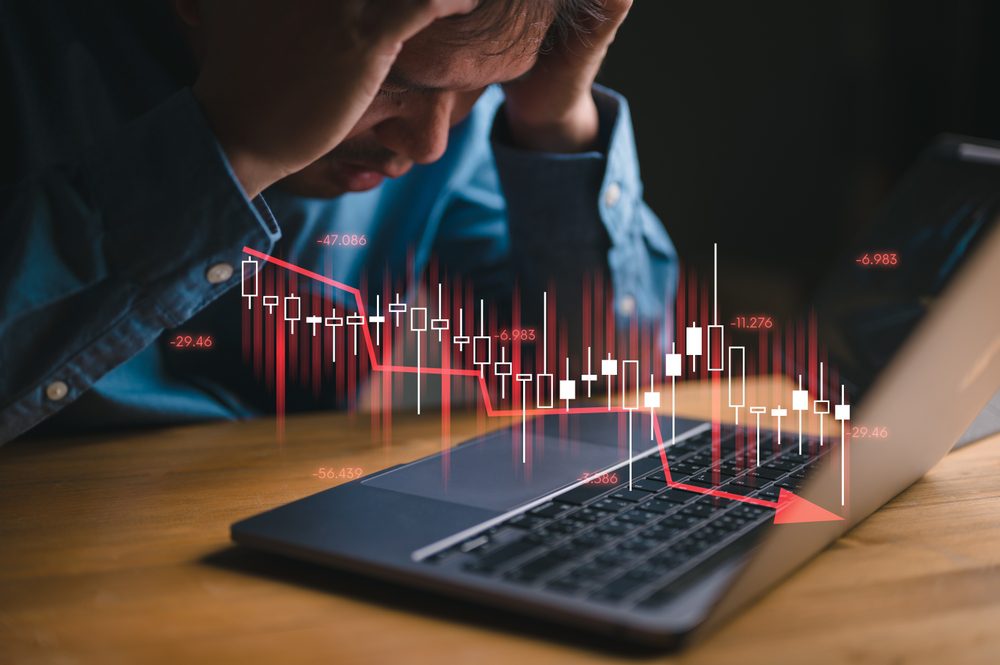The banking system is an essential component of the economy. It provides credit, finances investments, and facilitates transactions. A healthy banking system is crucial for economic growth and stability.
However, when the banking system is in crisis, it can have far-reaching consequences for the entire economy. In recent weeks, there has been a significant uptick in the number of reports on the worsening banking crisis in the United States. This blog post will explore the major credit crunch that has already begun and how $1.7 trillion in unrealized losses are aggravating the banking crisis.
The Impact of the Banking Crisis on Personal Finances

The banking crisis has the potential to impact personal finances in several ways. One of the most immediate concerns is the tightening of credit conditions, which could make it more difficult for consumers to obtain credit. With banks becoming more cautious about extending credit, consumers may find it harder to secure loans and credit cards. This could be especially challenging for those with poor credit scores or limited credit histories.
Another potential impact of the banking crisis on personal finances is the potential for higher interest rates. As banks face pressure to shore up their balance sheets, they may raise interest rates on loans and credit cards. This could make it more expensive for consumers to borrow money, which could further strain their finances.
Additionally, the banking crisis could lead to job losses and reduced income for some consumers. As businesses face financial difficulties and credit becomes tighter, they may cut back on hiring or reduce staff to save costs. This could leave some consumers without jobs or with reduced income, making it even more challenging to manage their finances and repay their debts.
The Impact of the Banking Crisis on Access to Debt Consolidation Loans
Debt consolidation loans are a popular tool for consumers looking to simplify their finances and reduce their debt. These loans allow consumers to combine multiple debts into a single loan, often at a lower interest rate than they were previously paying. However, the banking crisis could impact consumers’ ability to access these loans.
With credit conditions tightening and interest rates potentially rising, lenders may become more cautious about offering debt consolidation loans. They may require higher credit scores or more stringent eligibility criteria, making it more difficult for some consumers to qualify. Additionally, the reduced availability of credit could limit the number of lenders offering debt consolidation loans, further reducing consumers’ options.
The banking crisis had a significant impact on the availability of debt consolidation loans and personal loans for individuals. A debt consolidation loan is a type of personal loan that can help individuals consolidate their debt, including credit card debt, into one monthly payment. To qualify for the best debt consolidation loans, individuals typically need to have a good credit score and credit history and meet certain requirements such as minimum credit score and debt to income ratio.
However, due to the banking crisis, many lenders have tightened their lending requirements, making it more difficult for individuals to qualify for a debt consolidation loan. In some cases, individuals with bad credit may still be able to obtain a debt consolidation loan, but they may be subject to higher interest rates, origination fees, or balance transfer fees.
Fortunately, not all hope is lost. Many personal loan lenders still offer debt consolidation loans with reasonable repayment terms and without requiring collateral such as a secured loan or a home equity loan. These lenders may also perform a soft credit inquiry, which doesn’t affect the individual’s credit score, to provide loan funding based on their existing credit card debt and monthly payments.
Consolidating debt through a personal loan can help individuals save money on interest and simplify their debt repayment process. However, it’s important to carefully consider the origination fee and other fees associated with most debt consolidation loans to ensure that the loan payments are manageable and affordable. Additionally, individuals should ensure that they have a plan in place to avoid incurring more debt in the future and maintain a healthy bank account.
What Consumers Can Do to Protect Their Finances and Access to Credit

Despite the challenges posed by the banking crisis, there are steps consumers can take to protect their finances and access to credit. One of the most important steps is to maintain good credit. Consumers should make every effort to pay their bills on time, keep their credit utilization low, and avoid opening too many new credit accounts.
Consumers should also consider diversifying their sources of credit. While traditional banks may be tightening their lending standards, alternative lenders and online lenders may be more willing to extend credit. However, consumers should be cautious when using these lenders and should thoroughly research their options to ensure they are dealing with reputable lenders.
Finally, consumers should consider seeking the advice of a financial professional. A financial advisor or credit counselor can help consumers develop a plan to manage their debts and navigate the challenges posed by the banking crisis. They can also provide guidance on budgeting, saving, and investing, which can help consumers build financial resilience and weather economic downturns.
Bleeding Deposits and Tightening of Credit Conditions
Banks are bleeding deposits at an alarming rate, and the trend seems to be worsening. According to reports, during the week ending March 15, $98.4 billion was pulled out of US banks. The following week, during the week ending March 22, an additional $126 billion was withdrawn from US banks.
This trend is alarming because when banks lose deposits, they become less liquid and can be forced to sell assets to cover withdrawals. Unfortunately, US banks are sitting on a giant mountain of unrealized losses that could make this situation even worse.
The banking crisis of recent years has made it more difficult for individuals to access debt consolidation loans, a popular option for those struggling with multiple sources of debt. Debt consolidation is the process of taking out a new loan to pay off existing debts, combining multiple payments into one.
Consolidating debt can make it easier to manage and potentially lower overall interest rates, but with the banking crisis, it has become increasingly challenging to obtain approval for these types of loans. In many cases, individuals have turned to credit counseling services or other forms of debt management to address their financial difficulties.
For those still interested in debt consolidation, options like home equity loans or balance transfer credit cards may be available. Home equity loans allow individuals to borrow against the equity in their homes, while balance transfer credit cards offer a low or no-interest rate for a limited period of time. Unsecured personal loans may also be an option but may come with higher interest rates or loan origination fees.
Loan approval is typically based on a hard credit inquiry, which can affect an individual’s credit score, so it’s important to be aware of this before applying. Once approved, personal loan funds can be used to consolidate debt and create a more manageable plan for monthly debt payments. It’s important to review the loan agreement carefully and ensure that payments are made on time to avoid additional fees or penalties.
Unrealized Losses and Aggravating the Banking Crisis
A study released on March 13th revealed that US banks are holding unrealized losses of around $1.7 trillion. These losses are a result of interest rate increases, which caused securities holdings to lose value.
The study found that the total unrealized losses as of December 2022 were $1.7 trillion. This amount is comparable to the entire equity of the US banking system. The authors of the study issued a chilling warning, noting that the losses from the interest rate increase could aggravate the banking crisis further.

Impact on Lending
The banking crisis is also affecting lending. During the last two weeks of March, bank lending in the United States contracted by the most on record, indicating a tightening of credit conditions in the wake of several high-profile bank collapses.
Small banks are getting particularly tight with their money, with commercial bank lending dropping nearly $105 billion in the two weeks that ended March 29th. The slide in lending includes fewer real estate loans, and commercial and industrial loans, which could have far-reaching consequences for the real estate industry and entire business communities related to it.
Risks for the Entire Economy
The credit crunch could also hurt the entire economy. When consumers have access to less credit, they spend less money. When consumers spend less money, businesses bring in less revenue, and they start laying off workers. When workers get laid off, they get behind on their debts, creating even more stress on the banks. This new credit crisis threatens to spiral out of control.
The $1.7 trillion looming banking crisis has become a major concern for both bank customers and federal regulators. The financial sector is already witnessing the impact of this time bomb on the economy, with many banks facing significant risks of default. Regional banks such as Republic Bank, Signature Bank, and Silicon Valley Bank are particularly vulnerable to the crisis.
In the event of a bank failure, the Federal Deposit Insurance Corporation (FDIC) is responsible for reimbursing depositors up to $250,000 per account. However, this may not be sufficient to cover the deposits of wealthy clients or businesses that hold large sums of money in a single account. For instance, First Republic Bank has $42 billion in business accounts and wealthy clients who could lose all their money in the event of a bank failure.
The looming banking crisis has been linked to rising interest rates and the collapse of Silicon Valley Bank. In 2022, Credit Suisse reported significant losses following the collapse of the Swiss National Bank’s peg to the euro. This event triggered a sell-off in Silicon Valley Bank’s bonds, causing the bank’s collapse. The Justice Department has since launched an investigation into the bank’s collapse, which could have wider implications for the global financial system.
The crisis has raised concerns about the stability of midsize banks, which are facing increasing competition from larger banks and venture capital firms. The Treasury Department and the Federal Reserve are closely monitoring the situation and working with regional banks to ensure the safety of their customers’ deposits. However, the impact of the crisis on the global economy remains uncertain, and the future of regional bank stocks is uncertain.
Impact on Commercial Real Estate

The banking crisis has made a recession more likely. According to JPMorgan Chase CEO Jamie Diamond, the failures have provoked lots of jitters in the market and will clearly cause some tightening of financial conditions as banks and other lenders become more conservative. The biggest 25 domestic banks account for almost three-fifths of lending, although smaller banks are the most important providers of credit in some key areas, including commercial real estate.
Commercial real estate is facing significant risks, with remote work threatening the office sub-sector. Moreover, more than half of the $2.9 trillion in commercial mortgages will be up for refinancing in the next couple of years. Even if current rates stay where they are, new lending rates are likely to be 3.5 to 4.5 percentage points higher than they are for many of CRE’s existing mortgages.
Commercial property prices have already turned down, and Morgan Stanley analysts forecast that prices could fall by as much as 40%, rivaling the decline during the 2008 financial crisis. These kinds of challenges can hurt not only the real estate industry but also entire business communities related to it.
The Federal Reserve’s Role in the Banking Crisis
The Federal Reserve has a significant role to play in the banking crisis. The Fed was warned not to raise interest rates so quickly, but they did, and now they have broken the entire banking system. The move took their policy benchmark to a target range of 4.75% to 5%, up from near zero a year earlier.
Fed officials insist that everything is just fine, but the evidence suggests otherwise. The stress on the banking system is low compared to what was seen during the 2007-2009 financial crisis, but it is still concerning.
Outlook for the Future
It is difficult to predict how the banking crisis will unfold in the coming weeks and months. However, bank economists surveyed by the American Bankers Association expect credit conditions to continue to tighten during the months ahead. The headline credit index fell in Quarter Two to 5.8, decreasing 6.7 points to its lowest point since the onset of the pandemic. The reading indicates broad-based expectations for weaker credit market conditions over the next six months among bank economists.
Similarly, the consumer credit index fell 7.9 points to 5.8 in Quarter Two. EAC members expect credit availability to deteriorate more than credit quality, though almost all expect both to decline. The sub-50 reading indicates that consumer credit conditions are likely to weaken over the next six months.
The business credit index fell 5.6 points to 5.8 in Quarter Two. All EAC members expect business credit availability to deteriorate in the next six months, and most expect business credit quality to deteriorate. The sub-50 reading indicates that EAC members expect that overall credit conditions for businesses will continue to weaken over the next two quarters.
Conclusion
The banking crisis is a serious issue that is causing concern among economists, investors, and policymakers. The major credit crunch that has already begun and the $1.7 trillion unrealized losses aggravating the banking crisis are worrying signs that should not be ignored.
The impact of the banking crisis is far-reaching and could have consequences for the entire economy. The Federal Reserve has a significant role to play in addressing the crisis, and it remains to be seen how effective their efforts will be. As the situation unfolds, it is essential to monitor developments and take steps to protect oneself from the potential fallout.










